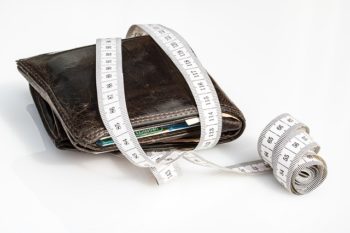
Your bills are past due, you’ve missed car and house payments, and you don’t think you’ll be able to dig yourself out anytime soon. Have you considered bankruptcy? It might be a way to start fresh. But your stack of bills is gigantic and it seems like you’ll never be able to pay it back.
Do you have too much debt to file for bankruptcy? Read on to find out.
Chapter 13 Bankruptcy Has a Debt Limit; Chapter 7 Does Not
In a Chapter 13 bankruptcy, you’ll work with your attorney and the court to create a three- to five-year repayment plan for your debts. Some secured debts, such as a home loan, may extend beyond the five-year period according to the terms of your contract, but at the end of five years, your unpaid unsecured debt will be discharged. If you have more than $1,395,875 in secured debt (for homes, cars, etc.) or more than $465,275 in unsecured debt (for medical expenses, credit card debt, etc.) you won’t qualify for Chapter 13 bankruptcy. (These numbers are periodically adjusted for inflation.)
So, does Chapter 7 bankruptcy also have a maximum debt limit?
There is no ceiling on the amount of debt with which you can file for Chapter 7 bankruptcy. Chapter 7 also is often preferred over Chapter 13 because it wipes out debt and doesn’t involve repayment. The rules under Chapter 13 are more stringent, but Chapter 7 is open to any individual with any amount of debt. However, it is worth noting that corporations cannot receive a discharge in Chapter 7 bankruptcy.
No Debt Limit, But Income Can Be an Issue
You don’t need to be concerned about qualifying for Chapter 7 bankruptcy because you have too much debt. That much we’ve established. However, there are income guidelines that determine your Chapter 7 eligibility. For a more detailed discussion on qualifying for Chapter 7 bankruptcy in California, take a look at this post, but we can summarize as follows:
Under heavy pressure from the credit card lobby, Congress passed bankruptcy reform in 2005 with the goal of making it more difficult for consumers to file for Chapter 7 bankruptcy and wipe out all their credit card debt. In order to automatically qualify, the debtor must make less than a California family of the same size over the last six months. If the debtor makes more, they must pass the means test in order to file for Chapter 7. The means test deducts your expenses from your income to determine whether you have enough income to fund a Chapter 13 plan. If you have enough disposable income, you won’t qualify for Chapter 7.
With Chapter 7, the issue for some debtors isn’t too much debt, it’s too much income.
See also: Income Guidelines for Chapter 7 Bankruptcy in California
How do I convert to a different type of bankruptcy?
While a qualified bankruptcy attorney can help you decide whether to file for Chapter 7 or Chapter 13, you may need to convert to a different type of bankruptcy. You must qualify for Chapter 7 bankruptcy and pass a means test, otherwise you’ll need to file Chapter 13.
Some reasons for converting from Chapter 7 to Chapter 13:
- Chapter 7 is faster, and you’ll pay less than Chapter 13;
- If you’re having trouble with your mortgage, you can still face foreclosure in Chapter 7; in Chapter 13, you have stronger power against foreclosure;
- You won’t have to give up any property in Chapter 13, though most property is still exempt under Chapter 7.
Some reasons for converting from Chapter 13 to Chapter 7:
- Under Chapter 13, you have to pay back most of your debts in full, including spousal or child support;
- A change in circumstances, such as a loss of a job or a serious illness, could make it difficult for you to keep up with Chapter 13 payments;
- You might be forced to switch from Chapter 13 to Chapter 7 if you can’t keep up with your payments, otherwise.
If you choose to convert from Chapter 7 to Chapter 13, you won’t need to pay any conversion fees. The court will look at your income, however, to ensure you’d be able to make payments under a Chapter 13 repayment plan. You also don’t generally need any approval in advance to switch from Chapter 7 to 13, if you do it once and do it in good faith. You’ll just have to file a motion with the court.
Meanwhile, if you choose to convert from Chapter 13 to Chapter 7, you’ll have to pay a $25 conversion fee. You also can only convert to Chapter 7 if you haven’t received a Chapter 7 bankruptcy discharge in the past eight years, and you also qualify for Chapter 7 under the means test. You’ll also have to file a motion with the court. If worse comes to worse and you can’t repay your Chapter 13 repayment plan, you can ask the court to dismiss your case — but then your creditors will start calling again and you’ll lose the benefit of the automatic stay, which also helps stop foreclosure in its tracks.
Need help with your bankruptcy?
If you live in California and are struggling with debt, you may want to consider filing bankruptcy. It can be a tough process, to say the least, so you’ll want to make sure you have a qualified bankruptcy attorney by your side to help you get a discharge. At Borowitz & Clark, we have experience with Chapter 7 and Chapter 13 bankruptcy, debt negotiation, and student loans. Don’t delay — contact us today for a free debt evaluation to get started on your road to recovery.
